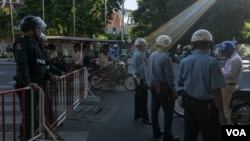Lawyers representing opposition leader Kem Sokha walked out of a hearing at the Appeals Court on Tuesday in protest after their client was prevented from attending the proceedings.
Sokha was due to appear in court after being charged with espionage earlier this month in a case widely recognized as politically motivated and based on thin evidence.
The prisons department, which is holding Sokha in a remote jail in Tbong Khmum province, said it would not facilitate Sokha’s transfer to Phnom Penh for the hearing on safety grounds.
Hem Socheat, one of Sokha’s lawyers, said they had decided to walk out of the courtroom after Judge Khun Leangmeng rejected a request to delay proceedings until Sokha could attend.
Legal experts have said the government’s decision to prevent Sokha appearing in court was unconstitutional.
“The presence of the accused in court is very important because he needs to have the opportunity to respond to the accusations,” Socheat said.
Several opposition Cambodia National Rescue Party lawmakers and supporters gathered outside the court on Tuesday to offer their support, but were blocked from entering the courtroom by authorities.
The court issued a statement after the hearing claiming that the defense’s decision to walk out meant they had given up defending their client and that it was legal to proceed with a criminal case despite the absence of the defendant.
Touch Tharith, appeals court spokesman, said the judge decided that Sokha would not be granted bail. “This morning’s trial was a hearing that needed to be conducted before the facts are established, which didn’t require the presence of the accused,” he said.
Sokha was arrested on September 3 and later charged with espionage for allegedly conspiring with the United States to undermine the government of Prime Minister Hun Sen. The government has produced a years-old video of a public speech Sokha gave in Australia, where he spoke about being advised by Americans to form a human rights group to gain grassroots support for democratic change, as evidence of the supposed conspiracy.
The accusation was rejected by the U.S. Ambassador William Heidt and the opposition.











